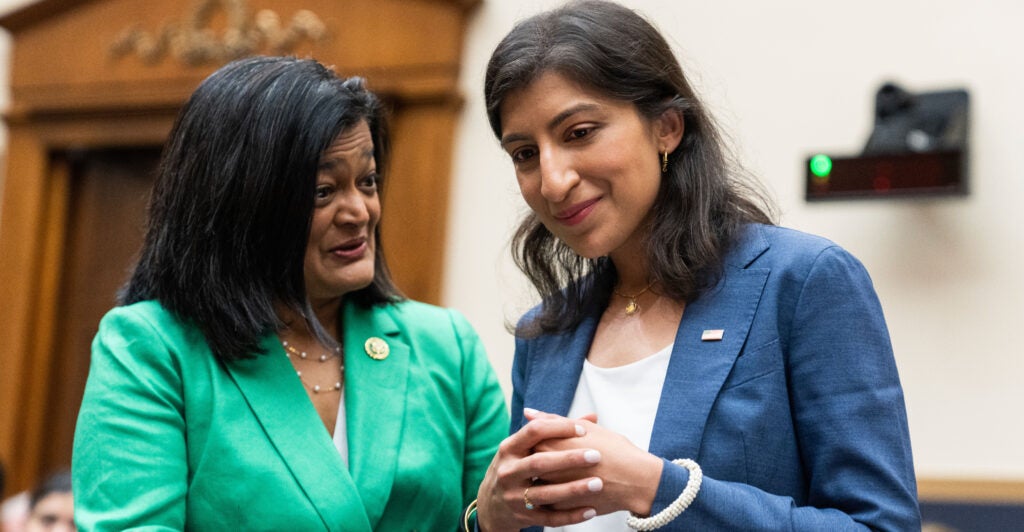Federal Trade Commission’s Self-Defeating War on ‘Big Grocery’
Tom Hebert /
Federal Trade Commission Chair Lina Khan has announced a new investigation into “Big Grocery” to examine the role “corporate greed” has played in high grocery prices.
Khan’s investigation is an election-year stunt to blame high prices on progressive whipping boys instead of government failure. If Khan were serious about lowering grocery prices, she would greenlight the Kroger-Albertsons merger and abandon plans to revive Robinson-Patman Act enforcement.
Grocery prices roughly tracked inflation from the 1980s to 2020, when they took off like a rocket. While even Khan admits that grocery prices have leveled off this year, they are still up 21% since the start of 2021.
Why the sharp increase? Government lockdowns that eviscerated the very global economic cooperation without which prices are naturally much higher. Robert Bork Jr. said it best: “If grocers are greedy, why did they wait decades until a notoriously anti-business administration arrived before they decided to sport their true colors?”
At the same time, President Joe Biden’s trustbusters have waged war on mergers and acquisitions, a critical feature of a free-market economy. Companies exist to create wealth for their shareholders by meeting consumer needs and wants. Companies merge with or acquire other companies because executives and shareholders believe the combination will better achieve that goal. Mergers help drive down prices through resulting efficiencies and economies of scale.
In October 2022, supermarket chain Kroger announced plans to buy Albertsons for $24.6 billion, which would bring more than 2,000 Albertsons locations under the Kroger brand. The new entity would operate more than 5,000 stores that support 720,000 American jobs nationwide. Before the ink was dry on the announcement, Khan announced that she would block the deal, and has left it in regulatory purgatory ever since.
Kroger and Albertsons have promised to divest 579 stores to clear antitrust scrutiny. No amount of concessions have satisfied the progressives that want to block the deal. A new amicus brief from Rep. Pramila Jayapal, D-Wash.; Sen. Ron Wyden, D-Ore.; and 25 other anti-shopper Democrats illustrates the flimsy progressive case against the Kroger-Albertsons deal.

Federal Trade Commission Chairwoman Lina Khan (right) confers with Rep. Pramila Jayapal, D-Wash., at a House Judiciary Committee hearing on July 13, 2023. The two have joined forces to try to block a merger of supermarket chains. (Tom Williams/CQ-Roll Call/Getty Images)
First, the brief claims that the deal would harm consumers through higher prices. If Khan greenlights the merger, the new entity would save more than $1 billion in administrative costs annually, which stores would pass onto consumers through lower prices. Second, the brief claims that the merger would harm workers, despite a public pledge from Kroger and Albertsons to keep all current workers employed and honor all existing collective-bargaining agreements. That’s why local unions like United Food and Commercial Workers Local 555 support the merger.
The brief’s third claim is its most laughable; namely, that the deal would contribute to a “growing consolidation of grocery chains leading to monopolistic practices.” Kroger and Albertsons combined would hold approximately 12% of the American grocery store market, and would not even control a majority of stores in Jayapal’s home state of Washington. The combination would allow Kroger and Albertsons to compete aggressively on price with Walmart, which holds 25% of the American grocery market, and Amazon, Costco, Aldi, Target, and other big-box stores.
The deal’s delay is enriching greedy trial lawyers at the expense of shoppers and taxpayers. Kroger and Albertsons have spent more than $864 million on merger-related expenses, a shameful waste of resources that could be put toward job creation or passing down savings to shoppers. Washington state is one of the states suing to block the deal, hiring a white shoe law firm to assist with the lawsuit. The firm is billing Washington taxpayers $1,190 an hour to block a deal that will lower Washingtonians’ grocery costs.
Adding insult to injury, the FTC is set to revive Robinson-Patman Act enforcement, a Great Depression-era law that prevents suppliers from selling “commodities of like grade and quality” to buyers at different prices. The Justice Department formally abandoned enforcement of the act in the 1970s because it raised prices by chilling negotiations between buyers and sellers.
Despite the harm to shoppers, Khan wants to revive Robinson-Patman Act enforcement because it will increase government control over the economy.
In a running gag on “The Simpsons,” diabolical clown Sideshow Bob cannot stop stepping on rakes as he carries out various self-defeating schemes to kill Bart Simpson. Life imitates art, as Khan cannot stop stepping on rakes in her quest to bring private industry under government control.
All of Khan’s crusades would raise grocery prices, not lower them. If Khan were serious about lowering grocery costs, she would get out of the way.
Originally published by RealClearMarkets.
